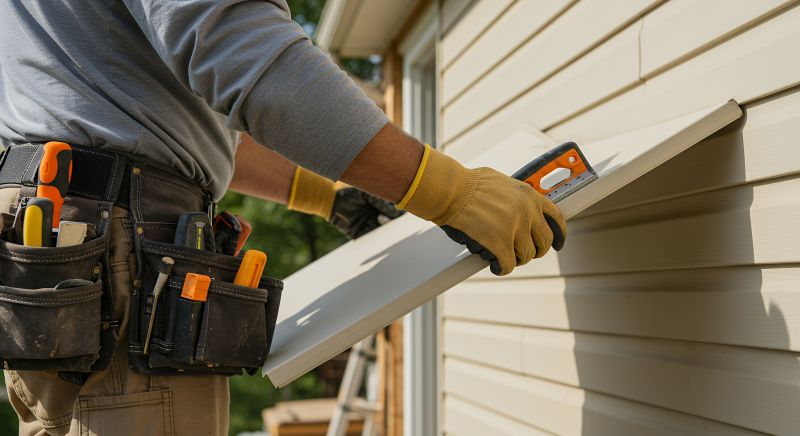Top-Rated Products For Siding Service Contractors
Equip your team with high-performance tools and materials that support successful siding installations and repairs.
 In Kent, Washington, where the climate can vary from rainy to dry throughout the year, selecting the right products for siding service is essential for maintaining the integrity and appearance of a building. Proper siding products help protect structures from moisture, wind, and temperature fluctuations, ensuring longevity and reducing maintenance needs. Whether you're considering a renovation or a new installation, understanding the variety of available siding products can assist in making informed decisions tailored to specific project requirements.
In Kent, Washington, where the climate can vary from rainy to dry throughout the year, selecting the right products for siding service is essential for maintaining the integrity and appearance of a building. Proper siding products help protect structures from moisture, wind, and temperature fluctuations, ensuring longevity and reducing maintenance needs. Whether you're considering a renovation or a new installation, understanding the variety of available siding products can assist in making informed decisions tailored to specific project requirements.
Top Overall Option
Versatile Siding Panel System
A versatile siding panel system that offers a balanced combination of durability, aesthetic flexibility, and ease of installation. Designed to accommodate various architectural styles and climate conditions, this product provides a reliable solution for both residential and commercial projects. Its adaptable features make it a popular choice among contractors and homeowners seeking long-lasting siding options.
Types of Products For Siding Service
Vinyl Siding
A popular, low-maintenance option available in numerous styles and colors, suitable for many residential applications.
Fiber Cement Siding
A durable material resistant to pests, fire, and weather, often used for its longevity and minimal upkeep.
Wood Siding
Provides a natural, classic appearance, with options for staining or painting, though requires regular maintenance.
Metal Siding
Made from aluminum or steel, offering excellent resistance to weather and pests, with a modern aesthetic.
Engineered Wood Siding
A manufactured wood product designed for enhanced durability and resistance to elements, mimicking natural wood.
Brick Veneer Siding
Provides a traditional brick appearance with lightweight panels that are easier to install than full brick.
Stone Veneer Siding
Offers the aesthetic of natural stone with easier installation and lower weight for various building types.
Composite Siding
Combines different materials to achieve specific aesthetic and performance qualities, often low maintenance.
Insulated Siding Panels
Includes a layer of insulation to improve energy efficiency while providing the appearance of traditional siding.
Aluminum Siding
A lightweight, corrosion-resistant option suitable for various climates, with minimal upkeep requirements.
Popular Choices
Widely used for its affordability and low maintenance, available in many styles and colors.
Known for its durability and resistance to pests and weather, suitable for diverse architectural styles.
Offers a natural look, with options for staining or painting to match various design preferences.
Provides a sleek, modern appearance with excellent weather resistance and minimal maintenance.
Designed for enhanced durability, mimicking natural wood with added resistance to elements.
Offers the traditional look of brick with easier installation and lighter weight panels.
Provides the appearance of natural stone, with flexible installation options and lower weight.
Combines aesthetic appeal with energy efficiency, suitable for various climates.
A durable, corrosion-resistant choice with a clean, modern look.
Siding products come in many materials, including vinyl, fiber cement, wood, and metal options. Each material offers unique benefits and considerations, such as durability, aesthetic appeal, ease of installation, and cost. For example, vinyl siding is popular for its affordability and low maintenance, while fiber cement provides enhanced resistance to pests and weather. The choice of siding often depends on the local climate, architectural style, and personal preferences.
When selecting siding products, it is important to consider factors such as insulation properties, fire resistance, ease of installation, and compatibility with existing structures. Proper installation techniques are equally critical to ensure siding performs as intended and maintains its appearance over time. Consulting with local siding professionals in Kent can provide valuable insights into the best products suited for the specific conditions of the region. Overall, investing in quality siding products can contribute significantly to the durability and curb appeal of any property.
Key Buying Considerations
- Climate suitability: Ensure the siding material can withstand local weather conditions in Kent, WA.
- Durability and lifespan: Consider the expected longevity and resistance to pests, moisture, and weather.
- Maintenance requirements: Evaluate how much upkeep the siding will need over time.
- Aesthetic compatibility: Choose a style and color that complement the building’s architecture and surroundings.
- Installation complexity: Determine whether the product requires professional installation or if it can be DIY-friendly.
- Insulation properties: Look for products that can improve energy efficiency if needed.
- Fire resistance: Check the fire rating, especially for commercial or multi-family properties.
- Cost and budget: Balance initial investment with long-term value and durability.
- Compatibility with existing structures: Ensure the siding can be integrated with current building materials.
- Environmental conditions: Consider resistance to wind, rain, and temperature fluctuations common in Kent.
- Warranty and support: Look for products that come with manufacturer warranties and reliable customer service.
- Weight and handling: Verify if the siding panels are manageable for installation and transportation.
- Availability of accessories: Ensure matching trim, corner pieces, and fastening options are accessible.
- Local building codes: Confirm the product complies with Kent, WA, regulations and standards.
- Environmental impact: While not eco-focused, consider products with minimal VOC emissions and safe manufacturing processes.
